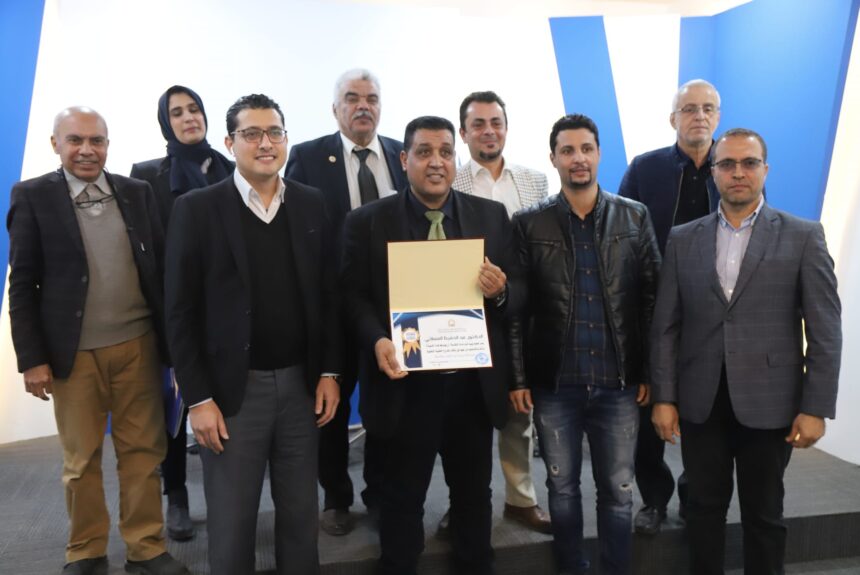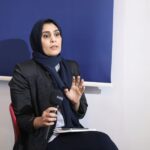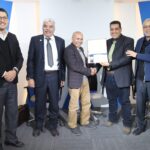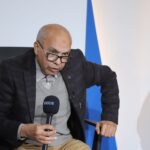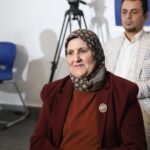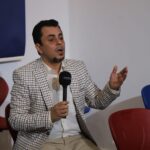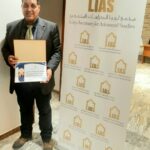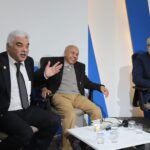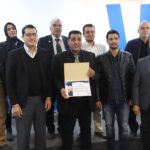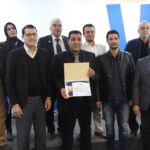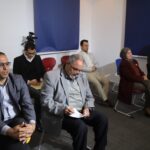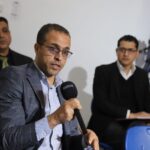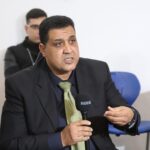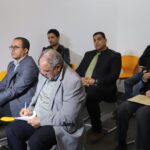On Sunday evening, a dialogue was held in Benghazi at the office of the Libya Academy for Advanced Studies entitled: “Cultural Heritage in the Face of Challenges.”
He prepared the dialogue and invited Professor Enas Al-Falah to her.
He prepared the dialogue and invited Professor Enas Al-Falah to her.
The dialogue was moderated by Dr. Jumaa Kashbour, Professor of Islamic Archeology and Head of the Department of Archeology at the University of Benghazi, and Dr. Saad Bouhajar, Professor of Prehistoric Archeology, and Dr. Khaled Al-Hadar, Professor of Classical Archeology, participated in the session.
Dr. Jumaa Kashbour opened with a speech in which he discussed the importance of cultural heritage and the challenges facing it. He defined the word inheritance and that in the past it meant a person’s inheritance from what came before him. Inheritance began on the basis of money or inheritance from his family and then expanded further and included everything in reality. Knowledge is inherited, morals are inherited, and customs and traditions are inherited. Also for generations, and with time, the inherited became has contents and meanings and became an aspect of science and knowledge, and higher licenses were granted in it to maintain its importance. After this expansion, other characteristics were attached to it, such as the popular heritage and the cultural heritage, where the genera were divided into purposes such as the Islamic heritage, the Christian heritage, and the Buddhist heritage, in the sense that religions have a heritage. In particular, it has become linked to peoples, for example, Indian heritage, Persian heritage, and Arab heritage, and thus the heritage has become a huge number of divisions and branches, which necessitated the necessity of studying it.
To preserve only the old is considered a deficiency. Therefore, we must preserve the old and care for it in order to give it a role in the present and also build on it in the future, because if the cultural heritage is known to people about its importance, it will remain safe, but if people leave it, it is destined to disappear.
Cultural heritage may be fought and may be a target in political conflicts and conflict between states. Therefore, preserving heritage is an important goal, and the state must preserve it with its capabilities, and members of society must also provide a helping hand with the state so that we can intensify its care and preservation.
In the cultural heritage, we must focus on the most important part of it, which is the antiquities, which are important in the cultural heritage, and the antiquities are an essential component of the cultural heritage.
Then Dr. Khaled Al-Hadar, Professor of Classical Antiquities, spoke and praised the initiative of the Libyan Academy for Advanced Studies for providing this opportunity. He stressed that Libya is one of the countries rich in cultural heritage. If we wanted to limit this cultural heritage, we would go back 150 thousand years, and the name Libya has historical depth. It was used to refer to a continent. Complete geography, as the world was made up of three continents: Europe, Asia, and Libya, which were called the parts of the African continent.
These borders did not come out of nowhere. They came as a result of a succession of civilizations, especially since we are bordering countries with civilizations such as the civilization of the Pharaohs in Egypt and the civilization of Cartagena in Tunisia. Civilizations were not interrupted in this country, as the peoples who settled in it left immovable material remains such as antiquities and movable remains. Likewise, Libyans immigrated and founded families. They ruled in Egypt and this is a source of pride for us.
What distinguishes the civilizations in Libya is that they are diverse, from the Greeks, Phoenicians, Romans, Byzantines and Muslims, which gives us cultural depth everywhere, especially the Green Mountain region.
The monuments and sites were inhabited by population groups who left us their cultural heritage that was passed down through the generations.
The ignorance of the Libyans in the past about the importance of antiquities made travelers steal antiquities and Italian colonialism, despite the suffering, killing, and displacement for them. It is a positive reminder to them that they protected the antiquities and issued laws to punish those who tamper with or steal antiquities, even though in doing so they protected their Roman antiquities in our country, established museums, and took care of the antiquities.
We miss museums. The city of Benghazi, despite its rare artifacts, does not have a museum for visitors.
Then Dr. Saad Bouhajar, Professor of Prehistoric Archeology, spoke, where he knew that the cultural or civilizational heritage is formed by the contact of one person with another, and if that does not happen, the cultural heritage is not formed, as the heritage influences and is affected, and the Libyans have customs that they practice in the Islamic heritage.
Then he talked about “the foul air in the Green Mountain, as it dates back 200 thousand years, and the beginning of the heritage was entirely prehistoric, as the manufacture of pottery and bones, all industries began in the prehistoric stage.”
At the conclusion of the meeting, the Libya Academy honored Professor Abdel Hafeez Al-Masalati, for his efforts in Libyan cultural education and awareness.
Libya Al-Mustaqbal channel’s coverage of Al-Hawariya.
Coverage of the Libya Rouha Al-Watan channel for dialogue.


